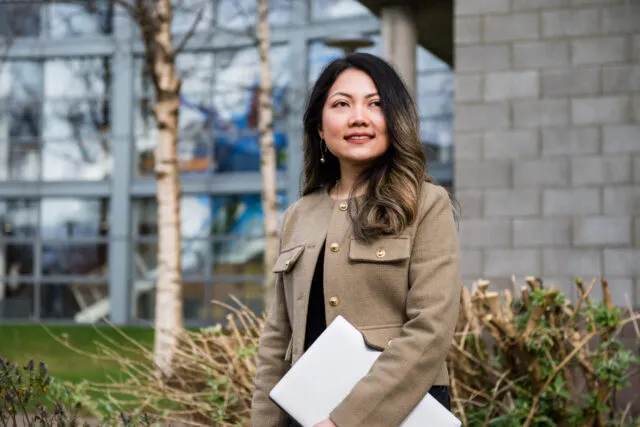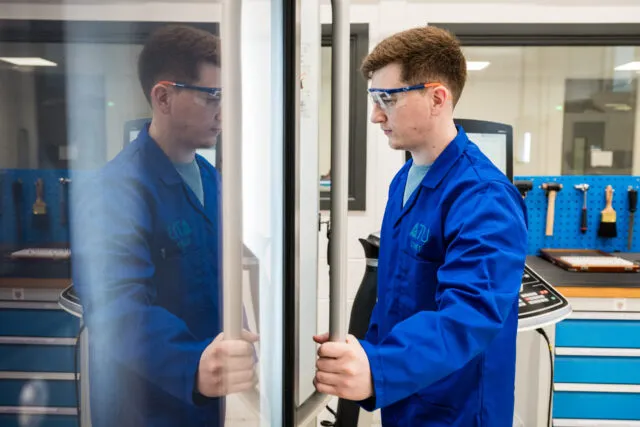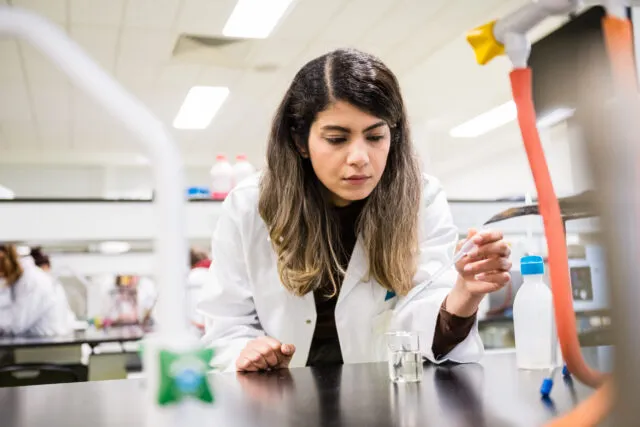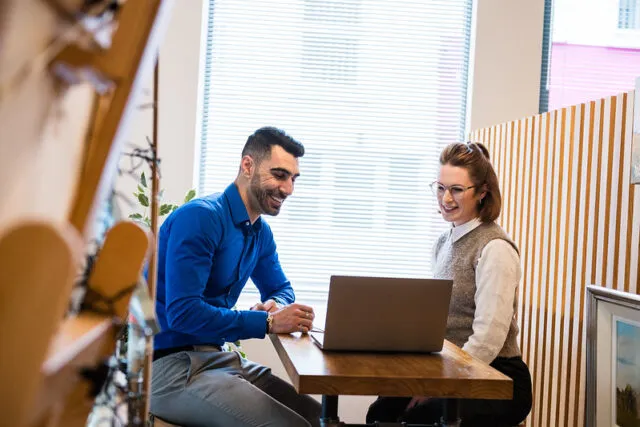Courses

Research & Innovation Capacity Building
Expanding our research ecosystem and fostering innovation across ATU

In this strategic priority area, we aim to enhance our institutional Research & Innovation (R&I) infrastructure and grow our research community.
R&I infrastructure roles
Over 30 new strategic roles will be appointed to support research services, infrastructure, researcher development, enterprise engagement, and knowledge transfer.
PhD researchers
RISE@ATU will also grow our research community through a new postgraduate training programme, placing 60 PhD students in enterprise-linked research projects aligned with regional priorities.
Postdoctoral researchers
10 postdoctoral researchers will lead collaborative initiatives with industry, helping to address real-world challenges and accelerate innovation.
Enhancing our R&I infrastructure with new staff
RISE@ATU will facilitate a strategic shift in how ATU operates its R&I structures, and enable the integration of legacy institutional structures into a unified, cohesive and impactful framework.
A key aspect of this is the appointment of new critical staff roles across five integrated R&I functions and Business Partners:
Office of the VP
- Integration Project Manager for Research & Innovation – RISE@ATU Project Manager – Eileen Gillen
- Projects Coordinator – Aidan Higgins
- Client Relations Officer – Mary Larkin
Research Services & Infrastructure
- Research Finance and Compliance Manager – Barry Dooney
- Finance & Compliance Officer – Stephanie Gorham
- Regulatory Compliance Coordinator – Chandni Naran
- Legal & Contracts Coordinator – Sarah Deignan
- Research Programmes Manager – Tara Doherty
- European Programmes Coordinator – Saul Crowley
- National Programmes Coordinator – Emma Francis
- Research Ethics Officer – Brian Doherty
Researcher Development
- Integration Project Manager for Research & Innovation Research – Digital Infrastructure – Shirley Wrynn
- Research Administration Coordinator – Veronica Cawley
- Research Information Management Senior Technical Officer – Fiona Doughan
- Researcher Training Coordinator – Ruth Moran
- Professional Development Coordinator – Denise McBride
- Data Management & Stewardship Officer – Kathryn Briggs
- Assistant Instructional Designer – Celeste Auge
Enterprise Development, Commercialisation & Incubation
- Enterprise Development Officer – Bernie Larkin
- SME Training Officer – Margaret Killeen
- Student Entrepreneurship Officer – Grace Latham
Research Business Partners
- Organisational Impact Research Coordinator (President’s Office) – Sarah Carroll
- Research Quality Assurance Coordinator (Academic Affairs and Registrar) – Charlotte McManus
- TU RISE Financial Reporting Coordinator – Karen M. Deignan
- Research Support, Scholarly Communications & Publishing Librarian – Fiona Fox
- Research Communications Officer – Jorden McMenamin
- Sustainable Research Compliance Officer – Laura Gaughan
- Research Administration Support 1 – Aisling Hynes
- Research Administration Support 2 – Ray McTigue
- Research Administration Support 3 – Appointment pending
- Research Cluster Coordinator 1 – James Britton
- Research Cluster Coordinator 2 – Shane Conway
- Research Cluster Coordinator 3 – Alan Hernon
- Research Cluster Coordinator 4 – Alan Naughton
PhD Researchers – Nurturing the next generation of scientific minds
The Postgraduate Researcher Training Programme (PRTP) provides 60 PhD researchers with funding, resources and diverse learning experiences to enhance individual growth and support the wider R&I ecosystem.
- Establish excellent, cohort-based training programmes within environments of research excellence across ATU
- Develop highly trained and skilled postgraduate researchers who are strongly networked within S3 priority sectors identified for the North-West region
- Equip graduates with the agility to adapt to evolving workplaces through the provision of transversal, transferable and field-specific skills and individual development supports
- Forge strong and substantial collaborations with regional enterprise in the design and delivery of innovative programmes of research and training
- Drive the development of groundbreaking technologies, accelerating the pace of innovation and enhancing competitiveness in areas of smart specialisation
- Leverage external funding for postgraduate research to grow the scale and impact of PRTPs
Meet the PhD researchers across our 5 PRTPs:
Coastal Connectivity (COAST)
- Haram Riaz – The Integration of Earth Observation, Citizen Science, Low-Cost Sensing Technologies and Machine Learning for Real-Time Coastal Dynamic Monitoring
- Randika Kalpa Makumbura – Generative Learning-Enabled Digital Twins and Predictive Modelling for Ocean Sustainability
- Zeeshan Ali – Anthropogenic Activities and Their Impact on the Functional Role of Saltmarshes
- Beth Brown – Quantifying and Capitalising on Eco-Activism in Irish Water Sports for Planetary Health
- Morena Gaudino – Extreme Weather Events and Plastic Pollution
- Charles Lucas Makio – Assessing the Flux of Buried Sedimentary Carbon to Marine Coastal Waters After Extreme Weather and Dredging
- Fauzia Mahanaz Shorobi – Molecular Characterisation of Marine Plastic Leachates and Associated Environmental Impacts
- Muteeb Sheikh – Determining the Potential of Domestic Rainwater Harvesting to Decrease Pollution in Coastal Areas
- Kathy Bannigan – Enhancing Coastal Resilience: A Digital Twin Approach to Contrastive Graph Generative Models for Coastal Protection
- Giulia Maria Rossi – Linking Oceanographical Connectivity Pathways and Environmental Pollution Pressures to the Genetic Structure of Planktonic Biota in Coastal Embayments
- Manojkumar Chand – Adapting the Biological Quality Elements (BQE) to Irish Benthic Coastal and Transitional Habitats
- Patricia Warren – Seaweed Ecosystem Services: Evaluating the Role in Coastal Erosion Mitigation, Carbon Sequestration and Nutrient Re-Uptake From Anthropogenic Source
Innovation, Digitalisation, Enterprise and Society (IDEAS)
- Sandi Saw Maung – Digitalisation and the Social Enterprise Ecosystem: Developing a framework to promote social enterprises in remote regions
- Bastien Filleux – An exploration of the interactions and relationships between key stakeholders within entrepreneurial ecosystems
- Farhan Ahmad – How effective is digitalisation as a tool for balanced regional development in Ireland?
- Leigh Moran – Shaping a Digitally Interconnected Innovation Corridor for MedTech Entrepreneurship in the Northern and Western Region of Ireland
- Kithmini Gamage – Information technology solutions for enhanced regional connectivity in the North and West of Ireland
- Sana Ullah – A Blockchain-Integrated Digital Twin Framework for Ensuring Supply Chain Security and Transparency in Irish MedTech SMEs
- Catherine White – Addressing climate action in Irish hospitality through adoption of a digitalised roadmap in SMTE Communities of Practice
- Madiha Rubeel – Harnessing the power of digital influencers for socially responsible business
- Neil Farren – Digital innovation for remote working
- Fakiha Bashir – Advancing women in leadership in the ICT and innovation sectors
- Chandler Tyrrell – Health outcomes of socially excluded older people in the age of digitalisation
- Sophie Stiehl – Building Business Communities in the Gaeltacht Regions through Leveraging the Digital Ecosystem
Innovation in Digital Manufacturing and Design (IDMD)
- Wojciech Gorszczak – Investigation into the Use of 3D Metal Printing to Develop Smart Vascular Models Able to Contract and Spasm
- Nasim Shokri – Development of a Dip-Coated Stretch Sensor to Monitor an Innovative Feed Delivery System
- Mostafa Mellizadeh – Optimisation of the Silicone Rubber Dipping Process Using Robotics
- Dipshikha Das – Automated Re-Configuration for Material Handling and Inspection in Advanced Manufacturing
- Gordon Hegarty – AI-Based Testing of Automotive ECU and Camera Hardware
- Gopika Sasankan Deepa – A Digital Twin for Enhancing Sustainability and Quality in Biopharmaceutical Manufacturing
- Ali Riaz – Electronically Controlled Adaptive AM Heat Exchanger (eHEX)
- Usman Aziz – Injection Mould Tooling Efficiency Enhancement Through Design Optimisation and Advanced Post-Processing Methods for Metal 3D-Printed Tooling
- Mahbloos Khan – Integration of Body-Worn Sensors and 5G/6G in Human Interfacing with Industry 4.0/5.0 Actuator Systems and Control
- Zayed Nasser – 5G Indoor Positioning Utilising Self-Morphing Wall Patch and Circular Polarization MIMO Transceivers for Smart Factories
- Kesara Wimal – Assuring Manufacturing Quality Assurance Records Using the Consensus, Immutability, Provenance, and Finality Characteristics of Blockchain Technology
- Mariam Elmofti – Digital Transformation for Sustainable Growth: A Small and Medium-Sized Enterprises (SMEs) Perspective
Translational Health Research, Innovation prevention & Equity (THRIVE)
- Lauren Callaghan – Smart Kids, Healthy Lives: Integrating Technology to Combat Childhood Obesity in Ireland
- Kashaf Arif – Investigating the use of health coaching applications and emerging technology to develop novel strategies as mitigation for the growing impact of social media and online platforms on student well-being
- Rackard Gavin – Evaluation of Nutrition interventions to improve sleep and health
- Eustes Kigono – Communicating benefits of population vaccination and screening programmes for optimal uptake and improved longevity in areas with regional disparities
- Shanika Arachchi – Cerebral Harmony: Integrating Science, Sports, and Engineering to study gender inclusive Brain Biomechanics for Brain Health and Healthy Ageing
- Fiona Burke – Investigate the effects of spending time in natural environments compared with urban environments on cognition, wellbeing, and brain activity
- Rebecca Tarpey – Management of Menstrual Cycle Symptomology for Quality of Life and Health
- Lucas Eleoterio Kupczik – Virtual Reality (VR) for the promotion of psychological and physiological benefit for older people
- Luke Canavan – Utilising AI and GPS data to determine forces for subconcussive impacts on injury risk exposure in contact and collision sports to inform strategies for brain injury management and recovery
- Audrey Faybe – Comparison of machine learning and classical statistics in predicting health outcomes in a lifestyle modification programme for obesity, and development of a user-friendly predictive application for patients
- Hannah Linney – Understanding associations between metabolic risk factors and social exclusion among older adults in the age of digitalisation
- Vanessa Nobles – The Value of Pharmacogenomic testing in primary care for the prevention on inappropriate prescribing in polypharmacy populations and the wider societal and economic impacts
MedAgritech AI eXcellence (MATX)
- Obed Adjei Peprah – AI-Enhanced Self-Updating Digital Twin for Optimised Spray Drying in Dairy Manufacturing
- Mohammad El-Iraky – Sensor Integration for Enhanced Safety and Automation in Agricultural Applications
- Iqra Naz – AI for Modelling Equine Reproduction
- Camillo Murgia – Adaptive Control of Robotics for Assembly in Space Applications
- Muhammad Jawad Bashir – Sustainable Precision Farming: An Explainable Self-Supervised Generative Learning Approach Leveraging the Internet of Robotics Things (IoRTS) and Digital Twin
- Ali Al Abbas – An AI-Driven Robotic System for Physical Exercise and Personalised Sports Rehabilitation
- Abdullah Haider Ali – Robotic Handling and Inspection of Complex Materials Using Tactile and Visual Feedback
- Joyce Mathew – Development of Electrochemical Wearable Sensors for the Rehabilitation Process Using Artificial Intelligence
- Ramsha Shahid – Low-Altitude Drone-Based 3D Reconstructions for Precision Hedgerow Analysis and Biomass Estimation
- Hirushan Sajindra – Exploiting AI to Assist Research Policy in Agritech/Medtech
- Anagha Ramesh M – Ionogel-Based Self-Powered Wearables for Energy-Efficient e-Health Monitoring
- FNU Talha – Generative AI for Non-Invasive MRI Enhancement in Brain Tumour Diagnosis
Postdoctoral Researchers – Fostering collaboration with enterprise
This initiative will provide essential supports for ten postdoctoral researchers, fostering collaborative research projects, co-designed and co-invested with enterprise partners. This design ensures that emerging researchers develop with direct engagement to regional needs and opportunities, and that their expertise and innovation benefits both academia and regional enterprises.
These ten postdoctoral researchers are currently being recruited, and will be listed here once appointed.




